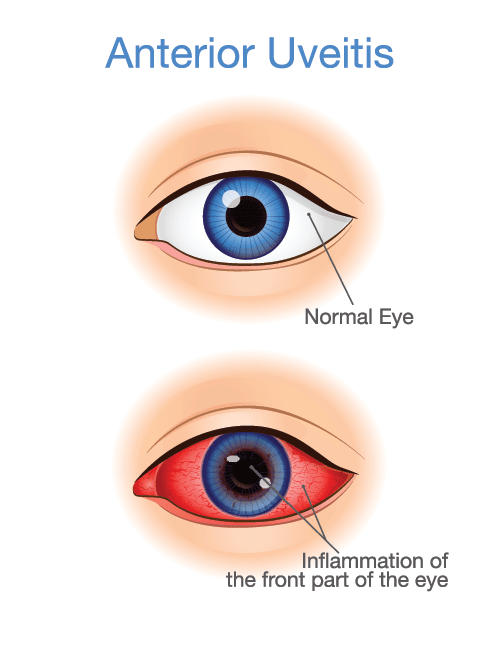Uveitis

Uveitis is an eye condition that can cause a variety of uncomfortable symptoms. At Retina Associates of Middle Georgia, our retinal specialists have the expertise needed to treat your symptoms and preserve your vision.
What Is Uveitis?
The uvea has many blood vessels that nourish the eye. The uvea is the eye’s middle layer and is comprised of processes in the eye called the ciliary body, choroid, and the iris.
Uveitis occurs when this layer of the eye becomes inflamed. The type of uveitis you have depends on where the inflammation is located.
There are three types of uveitis:
Anterior Uveitis
Swelling or inflammation in the front of the eye is called anterior uveitis. With this type of uveitis, symptoms usually start suddenly and can last for weeks.
These symptoms may come and go.
Intermediate Uveitis
Intermediate uveitis is caused by swelling in the middle of the eye. Symptoms caused by intermediate uveitis can last several weeks to months and also may come and go.
Posterior Uveitis
This type of uveitis occurs at the back of the eye. The symptoms caused by posterior uveitis typically develop gradually and last for years.
What Causes Uveitis?
The exact cause of uveitis is unknown. However, certain factors may make you more at risk for developing it.
You are more likely to develop uveitis if you have previously had certain infections like shingles, herpes simplex virus, or syphilis. You are also more likely to have uveitis if you have Lyme disease.
If you smoke, you are also at a higher risk of developing uveitis. You are at higher risk for developing uveitis if you have systemic inflammatory diseases like lupus.
What Are the Symptoms of Uveitis?
The symptoms of uveitis often vary from person to person, depending on the type and severity of each case. Symptoms may develop suddenly and may seem to appear off and on.
Some of the most common symptoms of uveitis are:
- Eye redness
- Blurry vision
- Light sensitivity
- Increase in floaters
If you have uveitis, you may or may not experience eye pain. If you notice any of these symptoms, it is essential to visit your eye doctor for a proper diagnosis and to get treatment to resolve your symptoms.
How Do Eye Doctors Treat Uveitis?
There are various treatment methods that eye doctors use to treat uveitis. Treatment is often required to avoid further issues.
Medication
Medication to treat uveitis can come in two forms: pills or eye drops. If your eye doctor prescribes pills, they will likely be steroids to reduce inflammation.
If your eye doctor recommends eye drops, they will be corticosteroid prescription drops.
Implants
If other treatment methods don’t work, your eye doctor may recommend placing an implant in your eye. Your eye doctor can implant this device during a surgical procedure.
The benefit of this implant is that it will continue to release medication to treat your uveitis. This way, you do not need to remember to take drops.
Injections
Your eye doctor may recommend eye injections with steroids to reduce inflammation in some cases.
Do you want to learn more about uveitis and how eye doctors can help treat this condition? Schedule an appointment at Retina Associates of Middle Georgia in Warner Robins, GA, today!



